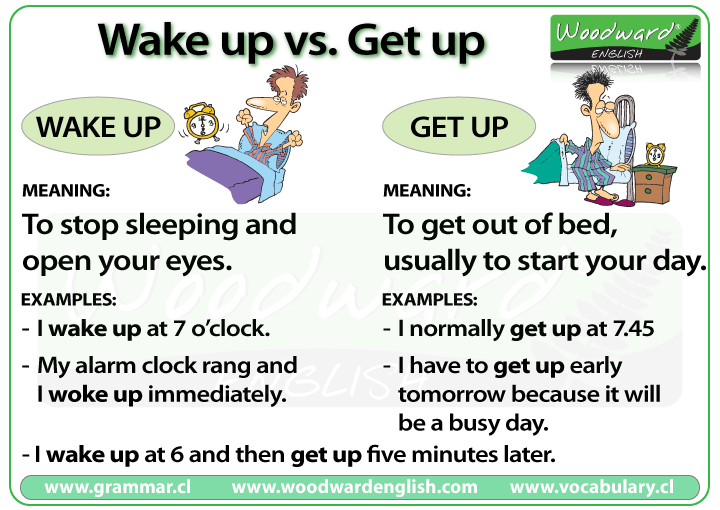Wake Up vs. Get Up
Learn English Vocabulary
Wake up and Get up have different meanings so they cannot be exchanged without a difference in meaning.
Wake up
Wake up = to stop sleeping and open your eyes.
When your alarm clock goes off in the morning you wake up because you are no longer sleeping.
You can wake up naturally (you body doesn't need to sleep any more) or something or someone can wake you up such as an alarm clock or a friend (or dog) jumping on your bed.
Wake up is a phrasal verb so only the first part, the verb, changes according to the tense.
Example sentences of Wake up:
- Why am I still tired when I wake up?
- My alarm clock rang and I woke up immediately.
- When she woke up, she no longer had a headache.
- Let's have the surprise ready before he wakes up.
- I hope she wakes up soon, we have to go.
To Wake (someone) up = To cause someone to stop sleeping.
The person that is being woken up (the object) is placed between the words Wake and Up. Often an object pronoun is used instead of the noun (or name).
Example sentences of Wake (someone) up:
- The sound of the baby crying woke me up.
- A loud noise outside her bedroom window woke her up.
- John woke his friend up by throwing a bucket of water on him.
- A strong earthquake woke us up.
Get up
Get up = to get out of bed (usually to start your day).
Get up can also mean: To go from a lying position onto your feet.
Example sentences of Get up:
- I first thing I do when I get up is go to the toilet.
- This morning I got up earlier than normal.
- I got up in the middle of the night to find myself another blanket because I was cold.
- I wake up around 7 o'clock but I don't get up until around 8. I like to lie in bed reading before I start my day.

Next Activities
Try this game to practice the difference between Wake up and Get up. (Coming soon)
If you found this English Vocabulary about Wake Up vs. Get Up interesting or useful, let others know about it.
